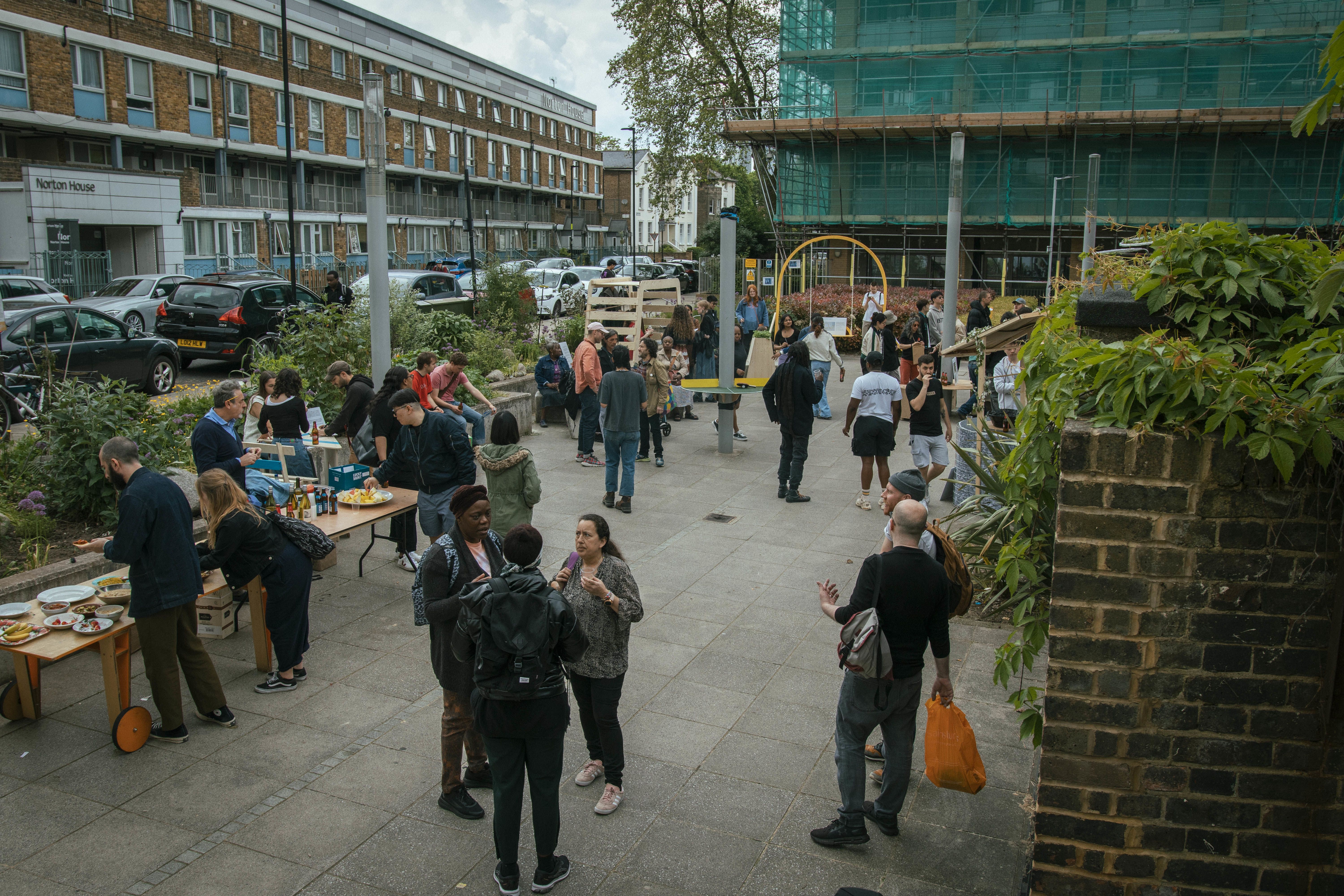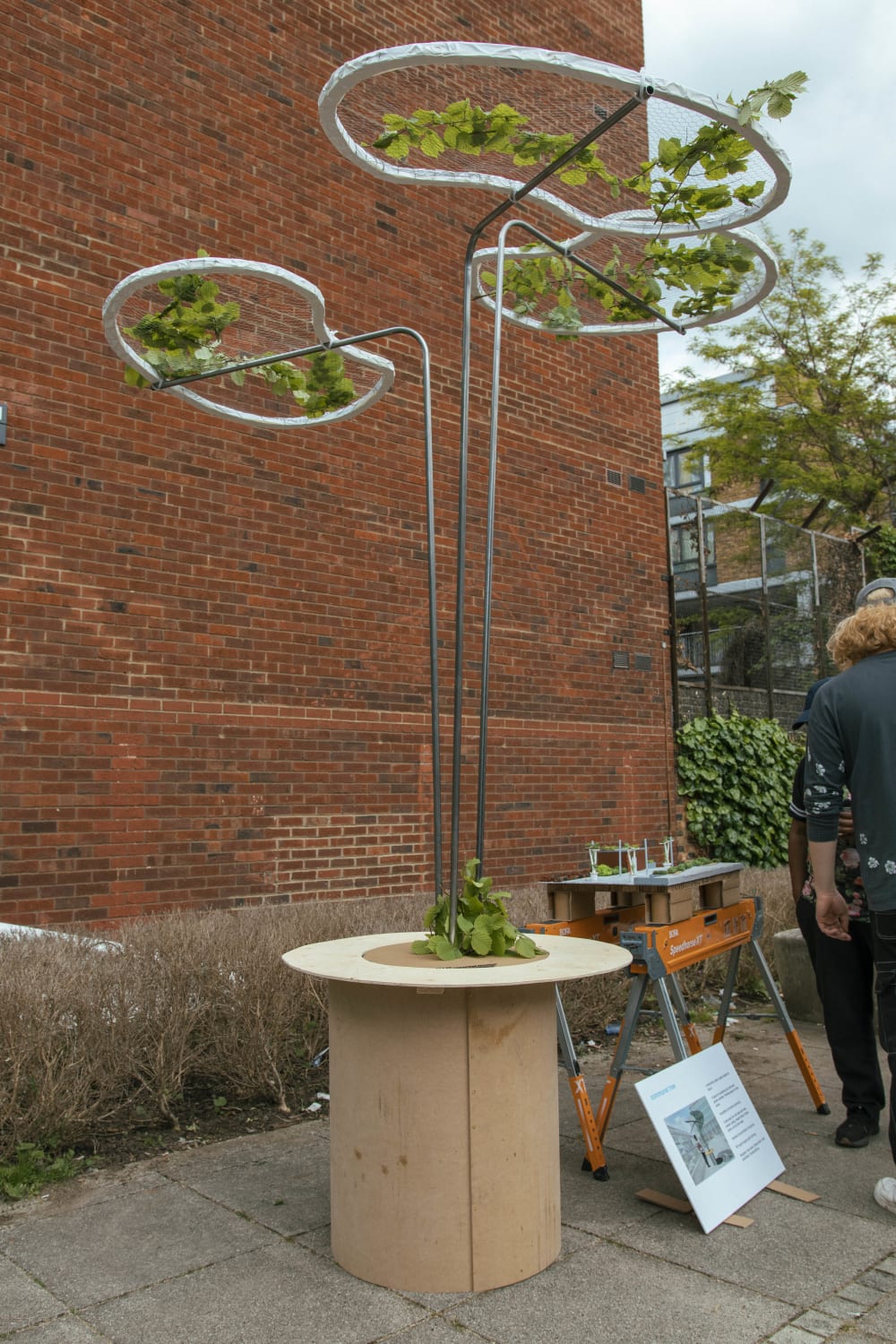
Chelsea College of Arts students use socially-engaged design to transform community centre plaza in Stockwell Park

- Written bySara Parsons
- Published date 11 August 2023

The challenge
Stockwell Park Community Trust over the last 30 years have been working to radically transform Stockwell Park Estate, including overseeing the refurbishment of many homes, tackling high crime rates and significantly enhancing the estate’s facilities for residents. Having worked with the Trust since 2005 through her design studio Flour, Fabiane Lee-Perrella, 2nd Year Leader and Senior Lecturer for BA Product and Furniture Design at Chelsea College of Arts, has, in recent years, facilitated creative collaborations between the Stockwell Park community and the College students. She knew there was a further opportunity to work together to help extend the outdoor space of the much-loved community centre, improving usability and creating a more welcoming and lively gathering place through bespoke furniture ‘hacks’ in the plaza.
The partnership with Stockwell Park Community Trust reflects UAL’s ongoing commitment to institutional social purpose and to building on, and expanding on, the unique role of design education at UAL. The university is focused on identifying opportunities for knowledge exchange between students, staff and communities in mutually beneficial ways. Led by Fabiane with her long-time collaborator Oscar Lessing, Course Leader for MA Designer Maker, the project was supported by a cross-disciplinary university team from across Challenge Lab – UAL’s living laboratory for socially-engaged practice, Technical Resources and BA Product and Furniture Design students.

The project
Over 6 weeks, 30 2nd year students had the opportunity to develop and use their socially-engaged design skills to create furniture that was suitable for use in the public realm. They learnt more about what design for social change can achieve through first-hand experience as they interacted with and co-created with residents, who spanned a diverse range of backgrounds, ages, interests and wide-ranging needs, from shelter to health and wellbeing support.
Speaking about why UAL is undertaking projects in the community, Fabiane said: “We have the tools of design, but the community has the lived experience of this space, so how can we do it together?” She explained: “There is so much for us to explore in teaching outside the classroom” adding, “The streets and communities are creative spaces. Leaving the university space allows community members to share their input. It brings everyone onto a more equal level and allows for true collaboration, where people can ignore traditional roles and really see the situation as a fresh opportunity.”
Commenting on the partnership with UAL, Julie Fawcett MBE, Director of Stockwell Park Community Trust said: “We have always enjoyed our time working with Fabiane and her wonderful UAL team. However, this project was extra special as it incorporated so many of our clients and their opinions on how The Trust should look, and what services we should offer. Everyone (staff and clients alike) loved working with the students and their instructors, and we (as a community) learnt so much about design and all the hard work that goes into these wonderful creations.”

Working collaboratively
Excitingly, the launch of UAL’s new Mobile Studio – a portable workshop that brings university resources to different spaces – meant students could work directly on site, fine-tuning their designs and receiving feedback immediately from the community. By enabling students to stay on-site, working in the Mobile Studio, the community could understand and engage with the design process as it evolved in real-time.
Commenting on the impact of the Mobile Studio in its debut outing, Richard Barton, Deputy Head of Technical Resources at UAL, said, “it allowed this project’s ambitions to be far greater due to the ability to create one-to-one prototypes of the furniture designs. It also allowed both the students and the community to design and think by creating forms that people could relate to in the spaces they would be situated in.” He noted, “I hope the Mobile Studio can help us push further outside of the campuses and will operate as an effective and activated social purpose project that can inspire more people to pursue a career in the arts.”
Fabiane said “If you give students the equipment and physical tools to create prototypes in situ, then, rather than relying on AI, students can test the practical application of their designs. They can respond to what feels right and wrong in the space, or benefit from the immediacy of someone walking by and saying, ‘what we want is…’

The designs
The project went through several stages, commencing with students conducting co-design workshops with residents. This staged approach was important as it helped students to build trusted connections with the community. Together they researched local assets like street art and music performances, gaining insights into the community’s diverse interests before developing concepts focusing on health, play, greening, shelter and public art.
Undertaking real-time testing and iteration of the prototypes on-site led students to creating designs that directly responded to their conversations with residents. 'Tipsy Railing', a design for a winding stainless-steel rod that is both playful and practical, providing a much-needed support for the elderly by transforming into 2 distinct railings and 2 innovative seats, was created in response to a member of the community sharing the need for a support that would help her and others when using a flight of stairs.
In May, the 9 furniture hack prototypes were exhibited and voted on by over 150 residents and visitors to the community centre, leading to 3 winners being selected. Following fabrication, these prototypes will be installed throughout the plaza, ready for use by the community in the autumn. The winning designs were 'Tipsy Railing', 'Conversation Table', a communal seating area with a table that provides a covered area for pets to rest inside (including the community dog Snoopy) and 'Communal Tree', a series of canopy structures inspired by nature that have been interspersed throughout the plaza for socialising and community garden activities.

The legacy
Reflecting on the project, Fabiane said “ultimately, as a university, our aim is to expose students to a range of different ways of working so they can find their affinities and where their ethos lies. We want our students to learn that research is bigger than books, it’s bigger than the internet, it’s bigger than papers. Observing people, talking to people, breathing the same air as people, offers not only an enormous amount of information, but also when you create these prompts as objects and people respond to them, not just with opinions but by, for example, sitting on them… you know your design has achieved its purpose. Students start to realise how rich this is and there’s nothing like the buzz of a member of the community saying ‘oh this is such a good idea!’ It’s beyond the mark a teacher can give, it’s a real response to their work.”
Julie Fawcett MBE, Director of Stockwell Park Community Trust said: “Our clients look forward to seeing (and using!) the winning designs in the autumn and we look forward to any and all future projects with this wonderful initiative.”
The project was a Challenge Lab initiative, UAL’s platform for applying socially-engaged practice to address global societal challenges at a local level. By establishing exploratory dialogues and projects between different local communities and contexts its aim is to interpret, interrogate and address shared societal challenges which affect and connect us all. Challenge Lab works to facilitate projects where UAL can make a meaningful impact to the communities that surround its campuses. Rachel Hutchison, Challenge Lab Manager said, “As an observer, you can see students’ process and thinking evolve as they engage with the community, who discuss and sometimes even challenge their ideas. Students develop an awareness of how people will use their designs in the long-term. This project was a great pilot for showing how our incredibly talented students, under the mentorship of our academic staff, can help to deliver meaningful social impact within our local communities. Through Challenge Lab we hope to deliver many more successful projects like this one.”
Anyone who might be interested in hosting or sponsoring a project like this can contact Rachel, to discuss more.
Joining Fabiane, Oscar, Rachel and Richard on the cross-disciplinary UAL staff team who made this project possible, were: Matthew Evans, Technical Production Manager; Kainoa Gruspe, Technician and Mobile Van Manager; Stefano Santilli, Visiting Lecturer; and William Waterhouse, Specialist Technician.